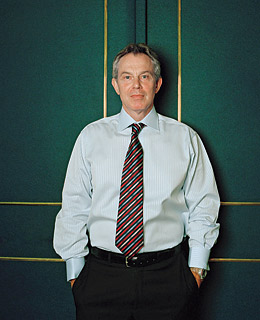
When my friend Tony Blair stepped down as U.K. Prime Minister last year, I advised him to take some time off with his family and make a list of the issues he felt passionately about and that he could continue to pursue. It was the least he had earned after a decade of modernizing his country's economy, making the U.K. one of the few nations to reduce their greenhouse-gas emissions more than required to meet their Kyoto target and leading the G-8 to historic commitments to support Africa and fight global poverty.
Tony listened to my advice graciously but ignored it completely by immediately accepting a new job as Middle East envoy for the Quartet. I have always admired Tony's willingness to wade into troubled waters. Ten years ago, he did a masterly job in helping to end 30 years of sectarian violence and broker a lasting peace in Northern Ireland. Now he is demonstrating the dedication and intensity to promoting economic opportunity in the Middle East, learning from his Irish experience that showing the concrete benefits of peace can play a crucial role in making a just and lasting peace possible.
Tony, 54, also knows that even the benefits of an enduring peace in the Middle East and the dramatic reductions in terrorism it would bring could be wiped away if we don't save the planet from the worst consequences of global warming. So he has taken on another big challenge: shaping a new global agreement to cut carbon emissions. Because my foundation is involved with projects to reduce greenhouse-gas emissions in more than 40 large cities on six continents, I know how important and difficult Tony's work is, and I look forward to the visionary leadership he will bring to it.
As his friend, I hope Tony finds fulfillment in advancing the public good as a private citizen. As a member of our interdependent global community, I thank him for not taking a day off when we need him the most.
Clinton, the 42nd U.S. President, runs the William J. Clinton Foundation